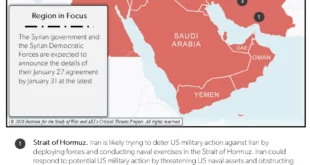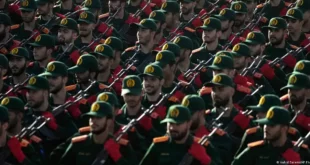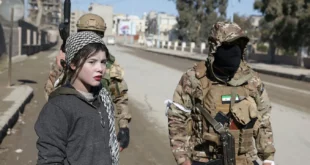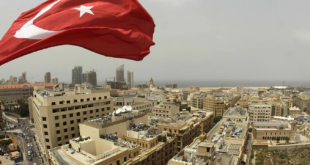BAGHDAD (AP) — Iraqi authorities said Sunday they had uncovered an insurgent plot to fire rockets at the courtroom when Saddam Hussein’s trial resumes this week.
The defence has challenged the legitimacy of the court and wants more time to prepare its case.
Ten witnesses are due to testify when the trial opens Monday after a week’s adjournment. One of the judges has removed himself from the panel since the November 28 hearing after learning that a co-defendant may have been involved in executing his brother.
A statement released by the office of Mouwaffak Rubaie, Iraq’s national security adviser, said the 1920 Revolution Brigades, one of the country’s best-known insurgent groups, planned to attack the building during Monday’s court session.
The statement said Iraqi intelligence uncovered the plot but gave no further details and did not say whether anyone had been arrested.
Saddam and seven co-defendants went on trial October 19 for the 1982 killing of more than 140 Shiite Muslims in the town of Dujail following an assassination attempt against him there. The defendants face the death penalty if convicted.
The trial has been dogged since the outset by security issues. Two defence lawyers have been assassinated since the opening session and a third has fled the country.
A US official close to the proceedings told reporters that the court Monday will begin hearing testimony from 10 witnesses, six of whom have agreed to have their identities revealed but insisted that they not be shown on television for security reasons.
Two others insisted on testifying behind a screen, and the others agreed to appear without any restrictions, the official said, speaking on condition of anonymity because of the sensitivity of the subject.
He said the defence had submitted three motions — challenging the legitimacy of the tribunal, arguing that Saddam’s actions were protected by presidential immunity and asking for more time to prepare its case. It was unclear if the judges would rule on them Monday.
The official predicted the hearings would last three or four days before adjourning until after national parliamentary elections December 15. Iraqi officials have said that holding the trial during the elections would strain the country’s security resources.
Each of the eight defendants will have at least one attorney in court Monday. Chief Judge Rizgar Mohammed Amin adjourned the November hearing for a week to allow two of the defendants time to choose replacements for their court-appointed lawyers.
The five-member judicial panel hearing the case will include one new judge who replaced the one who asked to be removed after learning that one of the defendants may have been linked to the execution of his brother, court official Raid Juhi said.
Names of both judges were not released because under security rules, the identities of all panel members are kept secret except for Amin.
In Jordan, former Attorney General Ramsey Clark told reporters he and other international lawyers will meet Saddam after the hearing Monday to set out a defence strategy. Clark left for Baghdad early Sunday accompanied by Jordanian lawyer Issam Ghazawi and ex-Qatari Justice Minister Najib Nueimi.
The three serve as advisers to Saddam’s lead Iraqi lawyer Khalil Dulaimi and they attended last week’s hearing for the first time.
“It will be our first real meeting where we’ll have the chance to discuss the trial,†Clark told AP Television News before flying to Baghdad. “He’s being held in total isolation, not seeing any member of his family, any friend, anybody he knew before.†The meeting with Saddam would be Clark’s second in six days.
The slow pace of the trial — which has included only two one-day sessions so far — has drawn sharp criticism from Shiite politicians in the run-up to the December 15 elections.
Some Shiite figures have urged supporters to vote for the main Shiite ticket to prevent Saddam from escaping justice.
During the November 28 session, Saddam lashed out at his treatment by American “occupiers and invaders†and lectured the chief judge about leadership.
The Saddam trial is continuing as tensions are rising throughout the country ahead of the elections, with several attacks against candidates and campaign workers reported throughout the country.
On Sunday, a crowd of about 60 men attacked former Iraqi prime minister Iyad Allawi and his entourage at the Imam Ali Mosque in the Shiite holy city of Najaf.
Television footage showed Allawi and others running from the shrine as they were showered with stones and shoes.
Allawi, a secular Shiite, described the incident as an assassination attempt and said the group was armed with pistols, knives and swords. Allawi said at least seven bullets were fired from the crowd.
“They were planning to kill the whole delegation, or at least me,†Allawi told reporters shortly after he arrived back in Baghdad. “One of them took out his pistol, but he panicked and it fell from his hand.†Earlier in the day, police said that about a dozen people, some of them carrying clubs, tried to prevent Allawi from entering the shrine. Allawi’s bodyguards fired shots in the air to disperse the crowd.
Allawi was prime minister when US and Iraqi troops seized control of Najaf from firebrand cleric Moqtada Sadr in August 2004 after heavy fighting. Many Shiites have not forgiven Allawi for his role in the assault.
Elsewhere, unidentified gunmen killed a Shiite parliamentary candidate and an Iraqi police commander in separate attacks Sunday. A bomb also detonated as a police patrol passed through central Baghdad, killing three civilians.
The attacks came one day after insurgents killed 19 Iraqi soldiers in a coordinated ambush northeast of Baghdad. On Thursday, 10 US Marines died in the deadliest attack against the military branch in four months.
 Eurasia Press & News
Eurasia Press & News



